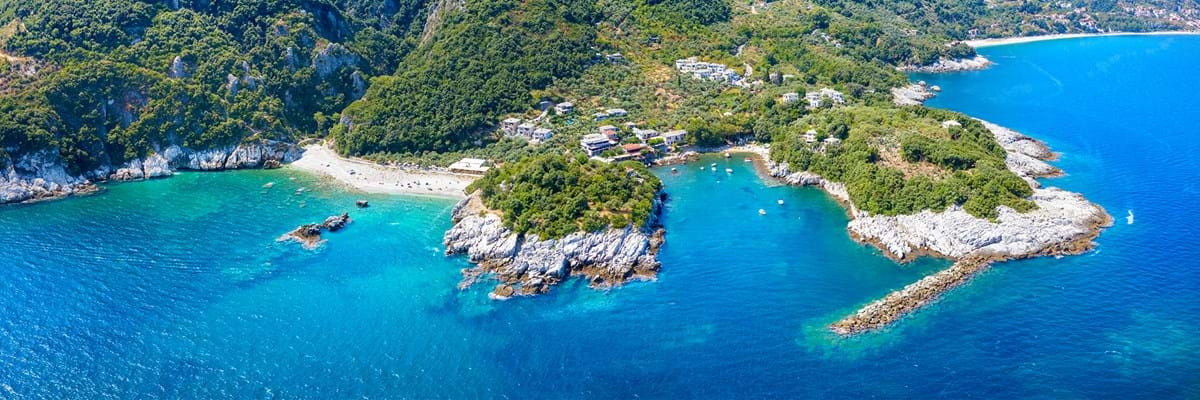Great activities during Pelion Peninsula Holidays
- Go horse riding from Argalasti for a unique way to explore
- Take the mountain steam train from Ano Lehonia to Milies
- Cruise the Pagasitikos Gulf on a gullet to out-of-the-way beaches & Trikeri island
- Enjoy the magnificent sandy beaches on the eastern coastline
- Explore the seaside resorts and the mountain villages of Tsagarada and Milies among many others
- Visit the cosmopolitan city of Volos with its archaeological museum, shops and atmospheric evening waterfront walks
- Hire a motorboat to explore hidden beaches and islands of the Pagasitikos Gulf
- Take a guided tour walking tour from Agia Kyriaki
- Walk the Milies - Potistika path to marvel at the views of the Aegean Sea and the Pagasitikos Gulf from the top of the mountain
- Learn to dive at the diving school in Trikeri, windsurf or sail a kayak to some otherwise unreachable places
- Take a trip to Meteora to be amazed by its incredible mountain top monasteries.
- Another great way to explore the region and the villages in the shadow of Mount Pelion itself is by car, which are widely available to rent in many of the tourist resorts and hotels – one of the best ways to explore the region is to lose your way and stumble across some real gems on the way.
- Moutzouris Steam train is a great way to experience the true beauty of the Pelion Peninsula departing from Ano Lehonia village passing through the traditional villages of Agios Athanasios, Agia Triada, Ano Gatzea and Pinakates, crossing stone bridges as you inhale the breath-taking nature and views of the region before arriving to Milies (apple trees) village built in an amphitheatre style on the mountain slopes of Mount Dikri.
In the mountains
Agios Georgios: A village with simply stunning views over the western coast, and across the Pagasitikos Gulf, there is also a church housing an ecclesiastical museum, the Taxiarchon convent and an art museum.
Argalasti: centrally positioned, Argalasti has good access to both sides of Pelion. It also offers a variety of shops, restaurants and bars.
Kissos: hidden in the mountains, Kissos means 'ivy'. In the village square is an old church renowned for its frescos.
Makrinitsa: A pretty, traffic-free village, also known as the Balcony of Pelion for its position on the mountainside with breathtaking, panoramic views overlooking the city of Volos and the Pagasitikos Gulf. The city was originally founded by Greek refugees fleeing Constantinople in the 13th century.
Meteora: North of the Pelion peninsula, but well worth making the journey, this is a breathtaking example of a complex of Eastern Greek Orthodox monasteries. Its name means 'suspended.' This reflects the fact that the six monasteries are built on natural sandstone rock pillars, seemingly defying the laws of physics, not to mention the impracticalities of construction. It is at the northwestern edge of the Plain of Thessaly, near the Pineios river and Pindus Mountains of Central mainland Greece. It has inspired and been filmed for many films, music and literature.
Milies: The name means 'apple trees', surrounded as it is, by apple and chestnut orchards to the north east, and olive groves to the south west. It is the end of the line for a narrow gauge railway line built in late 19th century. The train still runs for tourists today, to the village of Lehonia. There is a small museum of local crafts, and a beautiful church.
Mouresi: Village of flowers. From here, stunning views of the sea and mountains can be enjoyed. The main square is dominated by a tall linden tree. The church of the Dormition of Virgin Mary is a prime example of basilica, decorated with a wooden carved iconostasis.
Tsagarada: Located on the north-eastern side of the mountain at 500 metres, it commands an unforgettable view of the Aegean. The names means 'beautiful view' in Slavonic. The village extends down the slope to the seashore where small but beautiful beaches are to be found.
Vizitsa: This village has many excellent examples of traditional Pelion architecture. Spend a day wandering through the narrow streets sampling traditional Greek food at the tavernas.
Zagora: At the northernmost part of Pelion, the village's Slavonic name means 'behind the mountain'. It is one of the largest of Pelion's mountain villages and is surrounded by orchards fed by natural springs. Its apples have a special aroma and are exported in large quantities. Zagora was once the capital of Pelion and the centre for Greek enlightenment, famous for its contribution to learning, art, education and trade. A small 18th century library is in the central square where over 3000 maps and manuscripts dating back to 17th century can be found.



